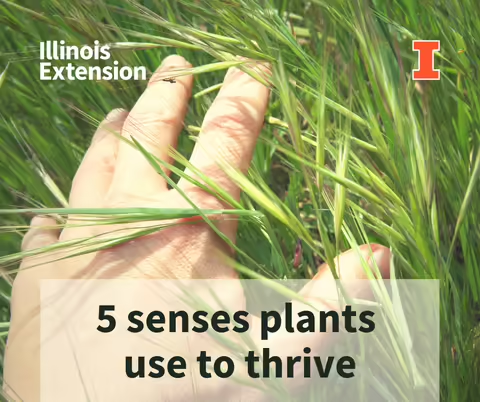I read an interesting article in Horticulture magazine by Jeff Cox about how plants do not have brains but "learn" how to respond to their environment using something like the five senses in humans.
Plants "see" light and turn toward it using a process called phototropism. Sunflowers are a prime example, rotating their blooms to face the sun directly, and other plants position their leaves to intercept the maximum amount of sunlight.
They seem to "hear" water running in underground channels, directing their roots in that direction toward the water source. Roots will grow toward enclosed pipes even though they cannot get to the water.
Roots "taste" the water they've reached. If it is rich in nutrients, they remain to take advantage of the beneficial food to the plant.
Root tips "touch" the soil to determine what is penetrable or a rock they then grow around.
Finally, one might say plants "smell" the carbon dioxide in the air so they can extract the carbon to produce sugars.
Also, without a brain, some plants can learn to stop expending energy on harmless stimuli. Mimosa pudica folds its leaves when touched as a defensive mechanism. If the plant is repeatedly touched and nothing harmful happens, it will stop reacting, thus not using energy unnecessarily.
Although plants do not possess brains, they can follow simple rules, and the ability to solve problems emerges from the repetition of those simple rules. According to Cox, "In other words, we solve problems using the ever-branching neuronal internet in our brains. A plant solves problems without a brain, using the intelligence from the proliferating network of cell connections as it grows."
An example is the root tips growing through the soil. The cells at the end produce moisture which softens the soil making it easier for new cells to advance. When the root hits a rock and the water can't penetrate it, the moisture softens the soil next to the rock, and the root continues in that direction.
Plants have a wide variety of cells, all of which have their own simple rules to follow. The result is the vast intricacy, type, and beauty we find in the plant world.
The Illinois Extension Master Gardeners of Edgar County are busy working on plans for April in Paris. Covid permitting, the gardening symposium will be on April 14, 2022.
SOURCE: Jan Phipps, Master Gardener, Edgar County
ABOUT EXTENSION: Illinois Extension leads public outreach for University of Illinois by translating research into action plans that allow Illinois families, businesses, and community leaders to solve problems, make informed decisions, and adapt to changes and opportunities.
